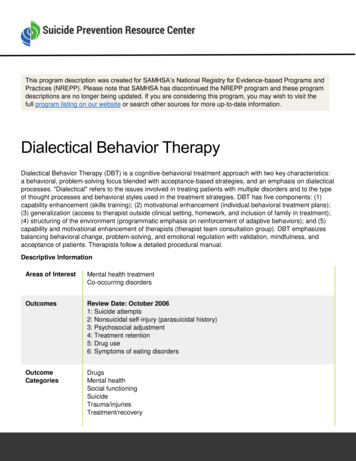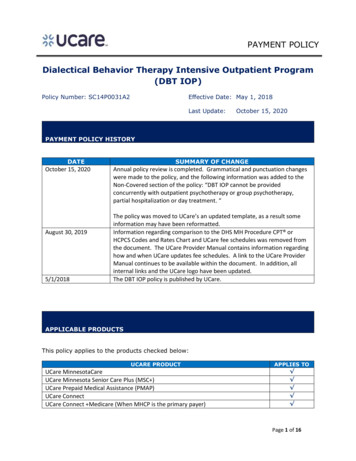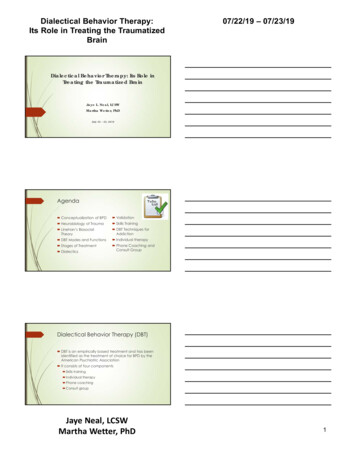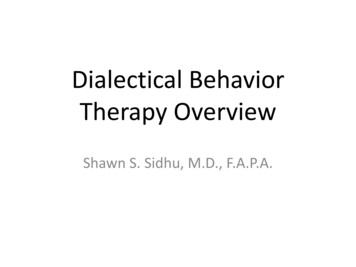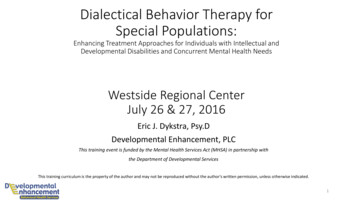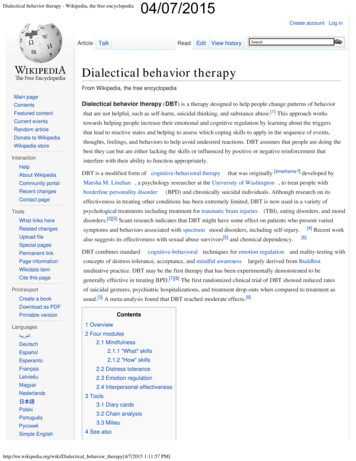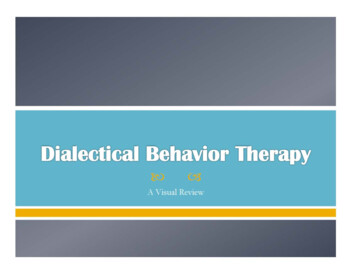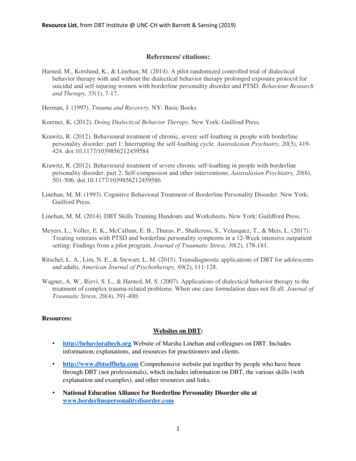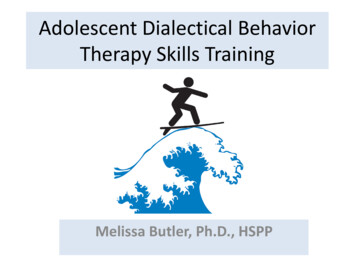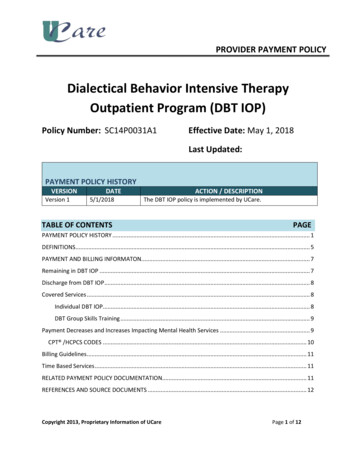
Transcription
PROVIDER PAYMENT POLICYDialectical Behavior Intensive TherapyOutpatient Program (DBT IOP)Policy Number: SC14P0031A1Effective Date: May 1, 2018Last Updated:PAYMENT POLICY HISTORYVERSIONVersion 1DATE5/1/2018ACTION / DESCRIPTIONThe DBT IOP policy is implemented by UCare.TABLE OF CONTENTSPAGEPAYMENT POLICY HISTORY . 1DEFINITIONS. 5PAYMENT AND BILLING INFORMATON. 7Remaining in DBT IOP . 7Discharge from DBT IOP . 8Covered Services . 8Individual DBT IOP. 8DBT Group Skills Training . 9Payment Decreases and Increases Impacting Mental Health Services . 9CPT /HCPCS CODES . 10Billing Guidelines . 11Time Based Services . 11RELATED PAYMENT POLICY DOCUMENTATION. 11REFERENCES AND SOURCE DOCUMENTS . 12Copyright 2013, Proprietary Information of UCarePage 1 of 12
PROVIDER PAYMENT POLICY“Payment Policies assist in administering payment for UCare benefits under UCare’s health benefit plans. PaymentPolicies are intended to serve only as a general reference resource regarding UCare’s administration of healthbenefits and are not intended to address all issues related to payment for health care services provided to UCaremembers. In particular, when submitting claims, all providers must first identify member eligibility, federal andstate legislation or regulatory guidance regarding claims submission, UCare provider participation agreementcontract terms, and the member-specific Evidence of Coverage (EOC) or other benefit document. In the event of aconflict, these sources supersede the Payment Policies. Payment Policies are provided for informational purposesand do not constitute coding or compliance advice. Providers are responsible for submission of accurate andcompliant claims. In addition to Payment Policies, UCare also uses tools developed by third parties, such as theCurrent Procedural Terminology (CPT *), InterQual guidelines, Centers for Medicare and Medicaid Services (CMS),the Minnesota Department of Human Services (DHS), or other coding guidelines, to assist in administering healthbenefits. References to CPT or other sources in UCare Payment Policies are for definitional purposes only and do notimply any right to payment. Other UCare Policies and Coverage Determination Guidelines may also apply. UCarereserves the right, in its sole discretion, to modify its Policies and Guidelines as necessary and to administerpayments in a manner other than as described by UCare Payment Policies when necessitated by operationalconsiderations. ”*CPT is a registered trademark of the American Medical AssociationCopyright 2013, Proprietary Information of UCarePage 2 of 12
PROVIDER PAYMENT POLICYThis page intentionally left blankCopyright 2013, Proprietary Information of UCarePage 3 of 12
PROVIDER PAYMENT POLICYPAYMENT POLICY OVERVIEWPRODUCT SUMMARYThis Policy applies to the following UCare products: Minnesota Senior Care Plus (MSC Plus)UCare Connect (Special Needs Basic Care – SNBC)Prepaid Medical Assistance Program (PMAP)MinnesotaCarePROVIDER SUMMARYTo be eligible to bill for DBT IOP services, each DBT IOP team must be certified through the Departmentof Human Services’ application process.POLICY STATEMENTDBT IOP is a program that utilizes a combination of personalized rehabilitative and psychotherapeuticinterventions that includes weekly therapy, group skills training, telephone coaching and consultationteam meetings. This policy outlines the payment and billing guidelines associated with DBT IOP.PATIENT ELIGIBILITY CRITERIAIn order for services to be covered by UCare the patient must: Be actively enrolled in an UCare MSC Plus, Connect, PMAP, or MinnesotaCare product;Be at least 18 years old;Meet one of the following criteria:o Have a diagnosis of borderline personality disordero Have multiple mental health diagnoses; exhibit behaviors characterized by impulsivity,intentional self-harm behavior or both; and be at significant risk of death, morbidity,disability or severe dysfunction across multiple life areas;Have mental health needs that cannot be met with other available community-based services orrequire services provided concurrently with other community-based services;Copyright 2013, Proprietary Information of UCarePage 4 of 12
PROVIDER PAYMENT POLICY Be at risk of one of the following, as documented in the patient’s record:o Have a need for a higher level of care, such as hospitalization or partial hospitalizationo Intentional self-harm (suicidal and non-suicidal) or risky impulsive behavior or becurrently having chronic self-harm thoughts or urges (suicidal or non-suicidal) althoughthe patient has managed to not act on them. Patients with chronic self-harm thoughtsand urges are at a greater risk of decompensationo A mental health crisiso Decompensation of mental health symptoms; a change in patient’s composite LOCUSscore, though not required, demonstrates risk of decompensationUnderstand and be cognitively capable of participating in DBT as an intensive therapy programBe able and willing to follow program policies and rules assuring the safety of self and others.DEFINITIONSTERMNARRATIVE DESCRIPTIONClinical SupervisionMeans the oversight responsibility for individual treatment plans and individualmental health service delivery, including that provided by the case manager.Clinical supervision must be accomplished by full or part-time employment of orcontracts with mental health professionals. Clinical supervision must bedocumented by the mental health professional cosigning individual treatmentplans and by entries in the client's record regarding supervisory activities.Diagnostic Assessment Means functional face-to-face evaluation resulting in a complete writtenassessment that includes clinical considerations and severity of the client'sgeneral physical, developmental, family, social, psychiatric, and psychologicalhistory and current condition. The Diagnostic Assessment will also note strengths,vulnerabilities, and needed mental health services.Dialectical BehaviorMeans a treatment program that uses a combination of individualizedTherapy Intensiverehabilitative and psychotherapeutic interventions. A DBT IOP involves weeklyOutpatient Programindividual therapy, weekly group skills training, and telephone coaching as(DBT IOP)needed and weekly consultation team meetings.Mental HealthMeans one of the following:Professional Clinical Nurse Specialist Licensed Independent Clinical Social Worker (LICSW) Licensed Marriage and Family Therapist (LMFT) Licensed Professional Clinical Counselor (LPCC) Licensed Psychologist (LP) Mental Health Rehabilitative Professional Psychiatric Nurse Practitioner (NP) Psychiatry or an Osteopathic physician Tribal certified professionalsCopyright 2013, Proprietary Information of UCarePage 5 of 12
PROVIDER PAYMENT POLICYDEFINITIONSTERMNARRATIVE DESCRIPTIONMental HealthPractitionerMeans a provider who is not eligible for enrollment, must be under clinicalsupervision of a mental health professional and must be qualified in at least oneof the following five ways:1. Holds a bachelor’s degree in a behavioral science or a related field, froman accredited college or university and meets either a or b:a. Has at least 2,000 hours of supervised experience in the deliveryof mental health services to patients with mental illnessb. Is fluent in a non-English language of a cultural group to which atleast 50% of the practitioners patients belong, completes 40hours of training in the delivery of services to patients withmental illness, and receives clinical supervision from a mentalhealth professional at least once a week until the requirements of2,000 hours of supervised experience are met2. Has at least 6,000 hours of supervised experience in the delivery ofmental health services to patients with mental illness. Hours worked as amental health behavioral aide I or II under Children’s Therapeutic Servicesand Supports (CTSS) may be included in the 6,000 hours of experience forchild patients.3. Is a graduate student in one of the mental health professional disciplinesand an accredited college or university formally assigns the student to anagency or facility for clinical training4. Holds a masters or other graduate degree in one of the mental healthprofessional disciplines from an accredited college or university.5.Is a tribally certified mental health practitioner who is serving afederally recognized Indian tribeIn addition to the above criteria: A mental health practitioner for a child patient must have trainingworking with children. A mental health practitioner for an adult patient must have trainingworking with adults.Means the process of informing UCare or their delegates of a specific medicaltreatment or service prior to billing for certain services. Services that requirenotification are not subject to review for medical necessity, but must be medicallynecessary and covered within the member’s benefit set. Services submitted priorto notification will be denied by UCareMeans an approval by UCare or their delegates prior to the delivery of a specificservice or treatment. Prior authorization requests require a clinical review byqualified, appropriate professionals to determine if the service or treatment ismedically necessary. UCare requires certain services to be authorized beforeservices begin. Services provided without an authorization will be denied.NotificationPrior AuthorizationCopyright 2013, Proprietary Information of UCarePage 6 of 12
PROVIDER PAYMENT POLICYMODIFIERSThe modifiers listed below are not intended to be a comprehensive list of all modifiers. Instead, themodifiers that are listed are those that must be appended to the CPT / HCPCS codes listed below. Based onthe service(s) provided and the circumstances surrounding those services it may, based on correct coding,be appropriate to append an additional modifier(s) to the CPT / HCPCS code.When a service requires multiple modifiers the modifiers must be submitted in the order listed below. If itis necessary to add additional modifiers they should be added after the modifiers listed below.MODIFIERHNNARRATIVE DESCRIPTIONHQFor purposes of this policy, the –HN modifier indicates services were furnished by aMental Health Practitioner or qualified Clinical Trainee when licensing and supervisionrequirements are metGroup ModalityU1Dialectical Behavior Therapy (DBT)CPT / HCPCS CODESCPT orHCPCSCODESMODIFIERNARRATIVE DESCRIPTIONH2019U1Individual DBT therapyH2019U1, HNIndividual DBT therapy by clinical traineeH2019U1, HQGroup DBT skills trainingH2019U1, HQ, HNGroup DBT skills training by clinical traineePAYMENT AND BILLING INFORMATONRemaining in DBT IOPTo continue in DBT, a patient must meet all of the following criteria:Copyright 2013, Proprietary Information of UCarePage 7 of 12
PROVIDER PAYMENT POLICY Be actively participating and engaged in the DBT program, its treatment components, andguidelines in accordance with treatment team expectationsMade demonstrable progress as measured against the recipient’s baseline level of functioningbefore the DBT intervention. Examples of demonstrable progress include:o Decreased self-destructive behaviorso Decreased acute psychiatric symptoms with increased functioning in activities of dailylivingo Objective signs of increased engagemento Reduced number of acute care services, such as emergency department (ED) visits, crisisservices and hospital admissionso Application of skills learned in DBT to life situationso Continue to make progress toward goals but have not fully demonstrated aninternalized ability to self-manage and use learned skills effectivelyo Be actively working toward discharge, including concrete planning for transition anddischargeo Have a continued need for treatment as indicated in the above criteria and by ongoingdocumented evidence in the recipient’s recordDischarge from DBT IOP To be discharged from DBT, one of the following criteria must be met:o Individual treatment plan goals and objectives have been met, or the recipient no longermeets continuing-stay criteriao The patient’s thought, mood, behavior, or perception has improved to a level where alesser level of service is indicated;o The patient chooses to discontinue the treatment;o Based on clinical assessment the provider determines the patient will no longer benefitfrom DBT services;o The provider complete necessary paperwork and refers the patient to needed services.Covered ServicesIndividual and group DBT services are eligible for coverage.Individual DBT IOPIndividual DBT IOP is a combination of individualized rehabilitative and psychotherapeutic interventionsto treat suicidal and other dysfunctional coping behaviors and to reinforce the use of adaptive skillfulbehaviors.Copyright 2013, Proprietary Information of UCarePage 8 of 12
PROVIDER PAYMENT POLICYDBT Group Skills TrainingDBT IOP group skills training is a combination of individualized psychotherapeutic and psychiatricrehabilitative interventions conducted in a group format to reduce suicidal and other dysfunctionalcoping behaviors and restore function through teaching the following adaptive skills modules: MindfulnessPersonal effectivenessEmotion regulationDistress tolerancePayment Decreases and Increases Impacting Mental Health ServicesBased on MHCP guidelines when certain mental services are furnished by a Master’s level provider atwenty percent (20%) reduction is applied to the allowed amount. Master’s level providers are: Clinical Nurse Specialist (CNS-MH) Licensed Independent Clinical Social Worker (LICSW) Licensed Marriage and Family Therapist (LMFT) Licensed Professional Clinical Counselor (LPCC) Licensed Psychologist (LP) Master’s Level Psychiatric Nurse Practitioner Master’s Level enrolled providerUCare follows MHCP guidelines when applying Master’s level provider reductions to eligible mentalhealth services. Impacted services are identified by indicator “(a)” in the DHS MH Procedure CPT orHCPC Codes and Rates Chart. A link to this chart is available in the References and Sources section ofthis Policy.Master’s level provider reductions are not applied to mental health services when they are furnished ina Community Mental Health Center (CMHC).In addition to the Master’s level provider reduction, UCare also applies a 23.7% increase to mentalhealth services identified with a “b” in the DHS MH Procedure CPT or HCPC Codes and Rates Chart. Alink to this chart is available in the References and Sources section of this Policy. This increase is appliedto behavioral health services when performed by: Psychiatrists; Advance Practice Nurses;o Clinical Nurse Specialisto Nurse PractitionerCopyright 2013, Proprietary Information of UCarePage 9 of 12
PROVIDER PAYMENT POLICY Community Mental Health Centers;Mental health clinics and centers certified under Rule 29 and designated by the MinnesotaDepartment of Mental Health as an essential community provider;Hospital outpatient psychiatric departments designated by the Minnesota Department ofMental Health as an essential community provider; andChildren’s Therapeutic Services and Supports (CTSS) providers for services identified as CTSS inthe DHS mental health procedure CPT or HCPCs codes and rates chart.UCare will utilize the above-referenced MHCP list to determine whether the decrease to Master’s levelproviders or a Mental Health Practitioner working as a clinical trainee should be applied, and/ordetermine if the 23.7% legislative increase will be applied to behavioral health services. If there is adiscrepancy between how DHS adjudicates claims and the chart published in the MHCP providermanual, UCare will adjudicate claims based on the chart published by DHS. When DHS updates thepublished chart, UCare will update payment requirements within forty (40) business days of receipt ofthe change. Claims previously paid will not be adjusted. Additional information regarding UCare feeschedule updates can be found in the UCare Provider Manual (Section 10-20, Fee Schedule Updates).The grid below identifies whether the Master’s level provider reduction and/or 23.7% increase appliesto service(s) associated with DBT IOP.CPT /HCPCS CODESCPT orHCPCSCODESMODIFIERH2019U1H2019U1, HNH2019H2019NARRATIVE DESCRIPTIONUNIT REASEAPPLYPROVIDERSELIGIBLE TOPERFORM SERVICEIndividual DBT therapy15 MinutesNoNo 15 MinutesNoNo U1, HQIndividual DBT therapy by aqualified Clinical TraineeDBT group skills training15 MinutesNoNo U1, HQ,HNDBT group skills training by aqualified Clinical Trainee15 MinutesNoNo DHS Certified DBTProvidersQualified ClinicalTraineeDHS Certified DBTProvidersQualified ClinicalTraineeIn the event that other government-based adjustments are required, UCare will implement thosechanges that apply to managed care organizations. The impact will be reflected in the providers’ finalpayment. When DHS updates the published list of impacted services / fee schedule, UCare will updatepayment requirements within forty (40) business days of receipt of the change. Claims previously paidwill not be adjusted. Additional information regarding UCare fee schedule updates can be found in theUCare Provider Manual (Section 10-20, Fee Schedule.Copyright 2013, Proprietary Information of UCarePage 10 of 12
PROVIDER PAYMENT POLICYBilling GuidelinesDBT IOP claims should be submitted using the MN-ITS-837P format or the electronic equivalent.Time Based ServicesWhen billing for services that include time as part of their definition, follow HCPCS and CPT guidelinesto determine the appropriate unit(s) of service to report. Based on current guidelines, providers mustspend more than half the time of a time-based code performing the service to report the code. If thetime spent results in more than one and one half times the defined value of the code, and no additionaltime increment code exists, round up to the next whole number. Outlined below are the billable unitsof service based on whether the description of the service includes the unit of measurement of 15minutes or 60 minutes:MINUTESFifteen (15) Minute Increments0 – 7 minutes8 – 15 minutesSixty (60) Minute Increments0 – 30 minutes31 – 60 minutesBILLABLE UNITS0 (no billable unit of service)1 (unit of billable service)0 (no billable unit of service)1 (unit of billable service)PRIOR AUTHORIZATION, NOTIFICATION AND THRESHOLD LIMITSUCare’s prior authorization and/or notification requirements and threshold limits may be updated fromtime to time. The most current information can be found here.RELATED PAYMENT POLICY DOCUMENTATIONREFERENCES TO OTHER PAYMENT POLICY DOCUMENTATION THAT MAY BE RELEVANT TO THISPOLICY.POLICY NUMBERPOLICY DESCRIPTION AND LINKSC14P0004A1Diagnostic Assessments and UpdatesCopyright 2013, Proprietary Information of UCarePage 11 of 12
PROVIDER PAYMENT POLICYREFERENCES AND SOURCE DOCUMENTSLINKS TO CMS, MHP, MINNESOTA STATUTE AND OTHER RELEVANT DOCUMENTS USED TO CREATETHIS POLICYDHS MH Procedure CPT or HCPC Codes and Rates ChartMHCP Provider Manual, Mental Health Service, DBT IOPMinnesota Statutes 256B.0625, Subd. 5l (Intensive mental health outpatient treatment)Minnesota Rule 9505.0370, Subd. 12 (Definitions)Minnesota Rule 9505.0372, Subd. 10 (Covered Services)Copyright 2013, Proprietary Information of UCarePage 12 of 12
Dialectical Behavior Therapy Intensive Outpatient Program (DBT IOP) Means a treatment program that uses a combination of individualized rehabilitative and psychotherapeutic interventions. A DBT IOP involves weekly individual therapy, weekly group skills training, and telephone coaching as ne
